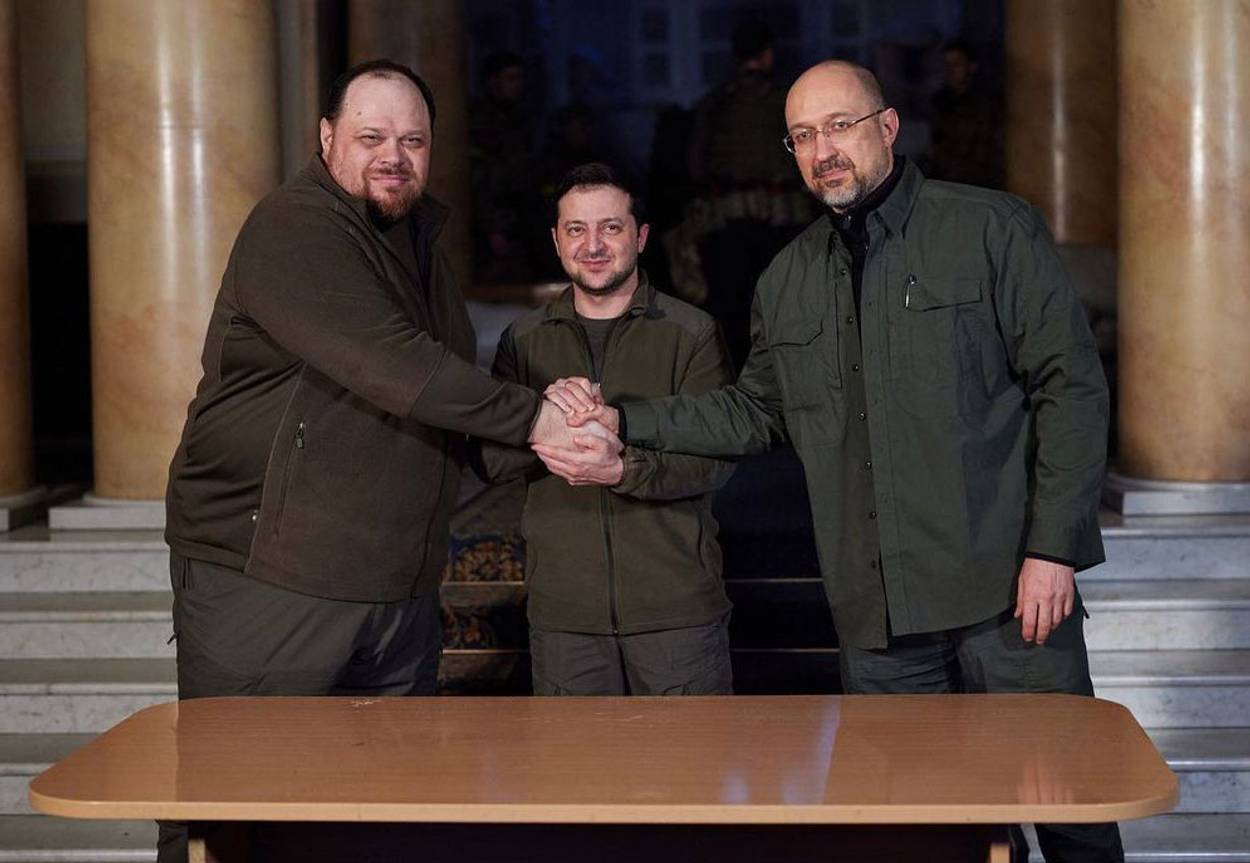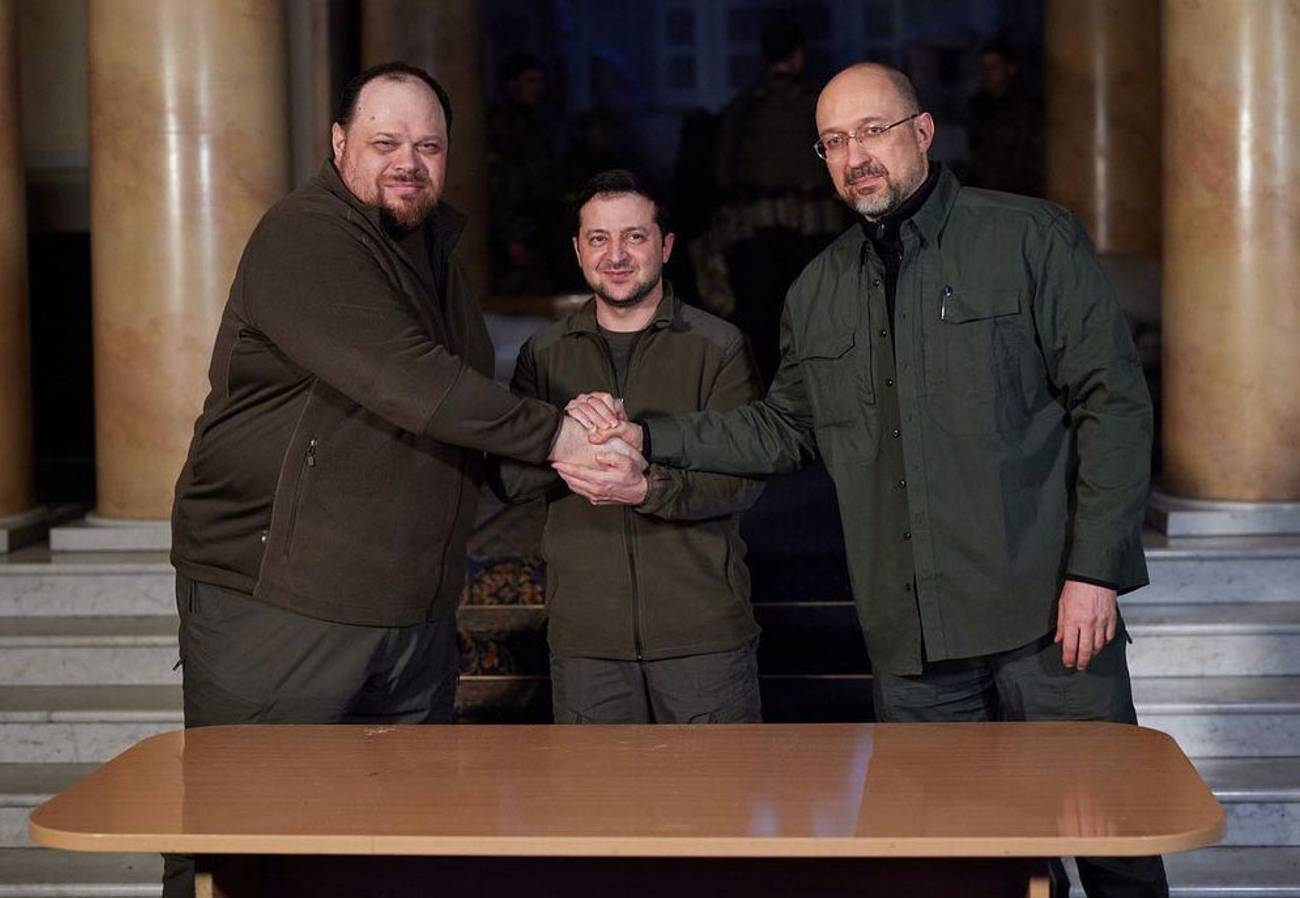“It’s very serious, it’s not a movie,” Volodymyr Zelensky told CNN from deep inside his military command-and-control bunker in Kyiv. “I’m not iconic, I think Ukraine is iconic.” This was a remarkable statement for a wartime president to have to make—especially one who ascended to the presidency from inside of the television screen, on the satire Servant of the People, having played an ordinary man who became president, and a president who saved Ukraine. At least half of the real-life Zelensky’s statement was also objectively false. He is now indeed an icon. His emergence as the most valorous, poised, and fearless wartime president of recent Western history is a truly bizarre manifestation of the randomness of history. War is a strange business—some people rise to the occasion and become heroes, while others shrivel.
When Vladimir Putin launched this war of aggression and choice, he had expected a quick collapse of the Ukrainian armed forces, and that the young, unserious Zelensky would either capitulate or flee. But Zelensky has not only stood his ground under pressure—he has also rallied the Ukrainian nation, whose existence he is helping solidify even as Putin seeks to destroy it, in a totally unpredictable manner. It is now functionally impossible for the Russian army to deliver the “decapitating” strike that Putin had ordered against the government without turning Zelensky into a world historical martyr, and an independent Ukraine into an immortal idea.
As the Russian air force flew sorties overhead, and while at least three death squads were out looking to liquidate him (as Ukrainian intelligence services have since alleged), Zelensky recorded videos of himself with his wartime cabinet outside of the presidential administration in order to demonstrate to the Ukrainian people that he had not fled the capital. “We successfully fought off enemy attacks,” he rallied the nation on television. “We are defending our country, our land, and the future of our children. Kyiv and various key locations near the capital are under our control. The occupiers wanted to capture our capital and to install their puppets like they had Donetsk. We broke that idea.”
Whatever happens to Zelensky now—whether he wins or extends or loses this war, or is finally taken out by an enraged Putin, who unlike him wouldn’t dream of visiting his troops in their tents or sharing in their danger—he will be remembered as a hero of liberty and democracy in the West, perhaps the most consequential since the end of the Cold War. Already I look forward to taking my grandchildren to visit the statues to him that will one way or another be erected wherever Ukrainians celebrate their survival and freedom. It is thanks to Zelensky that I have some measure of hope, however small, that I will get to visit them in Kyiv, Kherson, Kharkiv, and Odesa, and not merely in Toronto, Chicago, Tel Aviv, and Warsaw.
Ukrainians voted for a mixture of Benny Hill and Boris Johnson, and somehow wound up with Churchill.
I have grown used to telling the many people who ask me about Zelensky that “Ukrainians voted for a mixture of Benny Hill and Boris Johnson, and somehow wound up with Churchill.” My coined explanation makes Brits smile, but the facile comparison is in many ways inexact. “Comparisons to Churchill are unfair. Zelensky has a depth of feeling and understanding Churchill could only dream of,” wrote the Portuguese author Bruno Maçães, whom I saw in Kyiv only a week before the Russian bombs first began to fall indiscriminately on civilian housing.
Zelensky is a master communicator, and his speeches have been pitch perfect. He has, after all, practiced for this role his entire life. There is no doubt in my mind that the Ukrainian army has held and fought as ferociously as it has because of the confidence and conviction that Zelensky has been able to instill in them through his words and actions. Given a choice to evacuate the country by the Biden administration, Zelensky famously reposted that he needed “ammunition, not a ride.” The translator who interpreted his speech to the United Nations last weekend broke into sobs while repeating his words in English. The European Parliament quickly voted to fast-track the Ukrainian application for EU membership.
The Klitschko brothers—both heavyweight boxing champions, one of whom is the mayor of Kyiv and currently leading its militias and territorial defense forces with the moxie and intensity of an avenging angel—are of partial Jewish descent. It is surely no accident, comrades, that the “neo-Nazi” Ukraine that Putin desires to subjugate and cleanse for the sin of resisting his embrace, is led in battle by a president, a minister of defense, chief of administration, and a mayor of Kyiv who all have Jewish blood and roots. All of which signals the ratification of a country that does not look back to any hoary, folk conception of Ukrainian political ethos, but rather to the internationalism, cosmopolitanism, and historicity of a particular Ukraine in reality. This modern vision of Ukraine has won, regardless of the destruction that the superior weaponry of a demoralized and disorganized Russian army inflicts on it. It is proving so with a heroism much more universal than the doomed and narrowly anti-imperialist heroism of a Khmelnytsky or a Petlura.
Zelensky, who like me speaks Russian at home to his parents and wife, also represents a Ukrainian political nationality that is anti-Russian in a political sense (as opposed to just the self-pitying accusations of Russophobia bandied about by the Kremlin). He represents the opposite of the Russian notion of establishing order in a multiethnic state by centralizing authority with unbending force. Zelensky’s Ukraine is now embracing a loyalty to the nation that implies the acceptance and transcendence of difference, rather than the repression or elimination of differences. That is how and why it can be led by Ukrainians of Jewish descent, and why it has proved so intoxicating to a West that currently seems to lack such qualities of self-confidence and cohesion and the simple virtues of resilience, piety, and valor.
Incidentally, speaking recently on the evening news, the mufti of the Ukrainian Muslim community, Said Ismagilov—appearing straight out of central casting in a flowery black robe embroidered with golden flowers, a white turban, and steel-rimmed glasses—made such a stirring defense of the loyalty of Ukrainian Muslims to the Ukrainian state that he brought the newscaster who was interviewing him, a young woman, to tears.
Ismagilov demonstrated at once the absurdity, the soft decency, and the astonishing heroism of Ukraine, a country where a bunch of blood-and-soil nationalist types don’t care if you are a Greek or Tatar or Swede, as long as you have the right tattoos and are fighting under the command of their Jewish president. None of which is understood by either Putin or his self-righteous “new right” social media cheerleaders in the West. Zelensky’s Ukraine represents the hyperspecific and beautiful contradictions that stem from the acceptance of contradiction, the multiethnic tolerance, and the polyglot nationality of a thoroughly traumatized nation that just wants to exist, and to escape from the toxic bonds of world war and holocaust and gulag and famine that its revanchist neighbor has imposed on its population in the absence of its own ability to provide a normal life.
The Russian bombardment of the Kyiv television tower, which is located near the Babyn Yar memorial, was reported to have hit a part of the ravine inadvertently. The television tower stands right above the killing fields, overlooking the location of the memorial. There was no attack on the memorial complex itself, but the symbolism was hard to ignore. Zelensky called on world Jewry to “wake up to the threats posed by Russia’s invasion,” adding that “Nazism is always born in silence.” A translation of his speech into Hebrew was soon uploaded to the presidential Facebook page. The statement had as much to do with geopolitics as it did with his personal identity—Ukrainians have become frustrated over the past week with what they see as Israeli diplomatic equivocation, regardless of the evident needs of Israeli security, which must take into account the Russian military presence in Syria.
Zelensky had never seemed to me, including the one time that I discussed the issue with him over dinner, to be particularly comfortable with deploying or inhabiting his Jewish background in public. Despite the fact that Ukrainians enjoy pointing out his national success as an indication of a lack of antisemitism in the country—and the fact that his Jewishness was not a liability during the 2019 presidential campaign—it felt to me like his uncertainty about his identity would prove an awkward and evident tension. But now here he is, effortlessly deploying it for the greater good of the state. Zelensky is doubling down on his Jewish heritage, at the same time that he represents a sort of postmodern version of Pinocchio, stepping out of the television set and into the real world, where he has become a real boy.
Cometh the hour, cometh the man. Zelensky received a staggering 73% of the vote in the second round of the election in 2019. At the time, many outside analysts and observers viewed that tally as a manifestation of the capacity of television to create an illusory reality—in this case, a modern populist communicator naming an actual political party, Servant of the People, after the name of his television show. But reality has proved more personal, more contingent, than that analysis. The heroism that Zelensky has demonstrated in the past few weeks is a refraction of the resilience, cohesion in times of crisis, and other traits of the ordinary Ukrainian. Back in the comparatively peaceful days of 2019, three-quarters of the Ukrainian population took a look at Zelensky, and through some sort of heuristic that I cannot understand, let alone describe, saw a manifestation of their best qualities. And they were right. What is democracy, if not that?
Over dinner the night before his election victory, I impertinently joked to Zelensky that he would have to improve his English if he was to become a real Davos man. The joke was very much on me—and on all of us.
Glory to Ukraine! And glory to Zelensky, the bravest Jew on earth!

